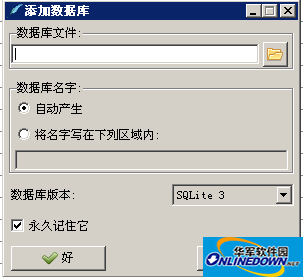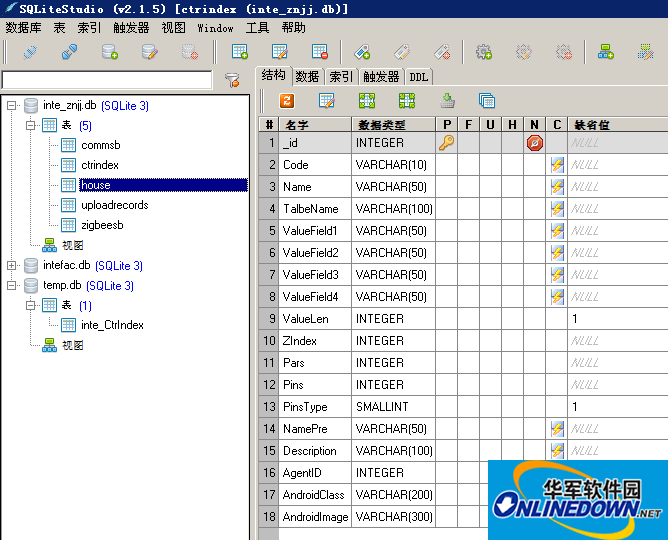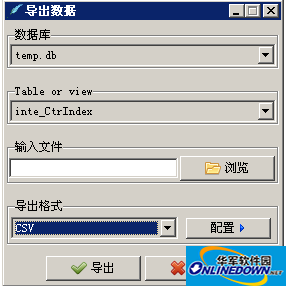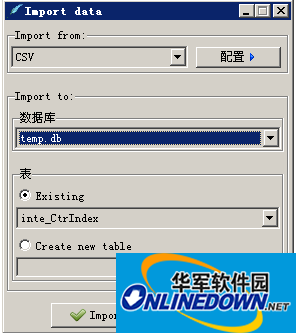网站首页 软件下载 游戏下载 翻译软件 电子书下载 电影下载 电视剧下载 教程攻略 音乐专区
霍普软件下载网-旗舰软件下载站,将绿色免费商业版破解软件、共享软件、游戏、电影、电视剧一网打尽!
| 软件 | Sqlite工具(SqliteStudio) |
| 分类 | 软件下载 |
| 语言 | 简体中文 |
| 大小 | 14MB |
| 版本 | 3.1.1 绿色中文版 |
| 下载 |

|
| 介绍 |
SqliteStudio是一款 Sqlite数据库可视化工具,是使用Sqlite数据库开发应用的必备软件,软件无需安装,下载后解压即可使用,很小巧但很了用,绿色中文版本。比起其它SQLite管理工具,我喜欢用这个。很方便易用,不用安装的单个可执行文件,支持中文。 SQLiteStudio 是一个跨平台的 SQLite 数据库的管理工具,采用 Tcl 语言开发。 SQLiteStudio的特色: 功能完善的sqlite2和sqlite3工具,视图编码支持utf8。 支持导出数据格式:csv、html、plain、sql、xml, 可同时打开多个数据库文件 支持查看和编辑二进制字段 SqliteStudio怎么用? 使用“sqlitestudio”打开(也可以使用其它sqlite可视化工具,个人习惯使用该工具,多语言小巧无需安装) 1、打开sqlitestudio ”数据库“-”添加数据库“  2、选择导出的那个数据库文件直接打开即可。  3、在sqlitestudio 可以创建和修改表也可以执行SQL语句基本可以满足常用需求 在sqlitestudio 导出表数据直接右键”导出表“ 默认格式CSV文件  4、导入表数据: 右键表名“import data to table”  SqliteStudio在Android程序中使用已有的SQLite数据库 1. 准备SQLite database文件 假设你已经创建了一个sqlite数据库,我们需要对其进行一些修改。 (译者注:这里原文是推荐了一个SQLite数据库管理软件,这个我觉得可以随自己的喜好,最Windows下面有多款可视化的SQlite数据库管理软件,可以方便的读取,编辑数据库,例如我用的是sqlitestudio 打开数据库,添加一个新的table “android_metadata",插入一行数据,具体的SQL如下: [sql] view plaincopyprint?在CODE上查看代码片派生到我的代码片 CREATE TABLE "android_metadata" ("locale" TEXT DEFAULT 'en_US') INSERT INTO "android_metadata" VALUES ('en_US') (译者注:上面两行是表明需要进行的操作,具体可以直接在sqlitesstudio中完成) 然后你需要对你数据表格的primary id 列重命名为 “_id”,这样Adroid会知道怎么对id列进行绑定,你可以很容易的在SQlite数据库管理软件中进行列编辑。 这两步之后,你的sqlite数据库文件就准备好了。 (译者注:这里我保留了id列,即没有对其进行重命名,测试证明也是没有问题的) 2. 在你的Android程序中复制,打开以及访问数据库 现在把你上一步准备好的数据库文件放在“assets”文件夹下面,然后通过继承 SQLiteOpenHelper类来创建一个Database Helper类, 你的DataBaseHelper类大致可以如下: public class DataBaseHelper extends SQLiteOpenHelper{ //The Android's default system path of your application database. private static String DB_PATH = "/data/data/YOUR_PACKAGE/databases/"; private static String DB_NAME = "myDBName"; private SQLiteDatabase myDataBase; private final Context myContext; /** * Constructor * Takes and keeps a reference of the passed context in order to access to the application assets and resources. * @param context */ public DataBaseHelper(Context context) { super(context, DB_NAME, null, 1); this.myContext = context; } /** * Creates a empty database on the system and rewrites it with your own database. * */ public void createDataBase() throws IOException{ boolean dbExist = checkDataBase(); if(dbExist){ //do nothing - database already exist }else{ //By calling this method and empty database will be created into the default system path //of your application so we are gonna be able to overwrite that database with our database. this.getReadableDatabase(); try { copyDataBase(); } catch (IOException e) { throw new Error("Error copying database"); } } } /** * Check if the database already exist to avoid re-copying the file each time you open the application. * @return true if it exists, false if it doesn't */ private boolean checkDataBase(){ SQLiteDatabase checkDB = null; try{ String myPath = DB_PATH + DB_NAME; checkDB = SQLiteDatabase.openDatabase(myPath, null, SQLiteDatabase.OPEN_READONLY); }catch(SQLiteException e){ //database does't exist yet. } if(checkDB != null){ checkDB.close(); } return checkDB != null ? true : false; } /** * Copies your database from your local assets-folder to the just created empty database in the * system folder, from where it can be accessed and handled. * This is done by transfering bytestream. * */ private void copyDataBase() throws IOException{ //Open your local db as the input stream InputStream myInput = myContext.getAssets().open(DB_NAME); // Path to the just created empty db String outFileName = DB_PATH + DB_NAME; //Open the empty db as the output stream OutputStream myOutput = new FileOutputStream(outFileName); //transfer bytes from the inputfile to the outputfile byte[] buffer = new byte[1024]; int length; while ((length = myInput.read(buffer))>0){ myOutput.write(buffer, 0, length); } //Close the streams myOutput.flush(); myOutput.close(); myInput.close(); } public void openDataBase() throws SQLException{ //Open the database String myPath = DB_PATH + DB_NAME; myDataBase = SQLiteDatabase.openDatabase(myPath, null, SQLiteDatabase.OPEN_READONLY); } @Override public synchronized void close() { if(myDataBase != null) myDataBase.close(); super.close(); } @Override public void onCreate(SQLiteDatabase db) { } @Override public void onUpgrade(SQLiteDatabase db, int oldVersion, int newVersion) { } // Add your public helper methods to access and get content from the database. // You could return cursors by doing "return myDataBase.query(....)" so it'd be easy // to you to create adapters for your views. } 就这样。 现在你可以创建一个新的DataBaseHelper实例,然后调用createDataBase(),然后再调用openDataBase()方法,记住修改DB_PATH字符串中“YOUR_PACKAGE”为你真正的package名称(也就是说com.examplename.myapp) 以下是示范代码: [java] view plaincopyprint?在CODE上查看代码片派生到我的代码片 ... DataBaseHelper myDbHelper = new DataBaseHelper(); myDbHelper = new DataBaseHelper(this); try { myDbHelper.createDataBase(); } catch (IOException ioe) { throw new Error("Unable to create database"); } try { myDbHelper.openDataBase(); }catch(SQLException sqle){ throw sqle; } ... |
| 截图 | |
| 随便看 |
|
免责声明
本网站所展示的内容均来源于互联网,本站自身不存储、不制作、不上传任何内容,仅对网络上已公开的信息进行整理与展示。
本站不对所转载内容的真实性、完整性和合法性负责,所有内容仅供学习与参考使用。
若您认为本站展示的内容可能存在侵权或违规情形,请您提供相关权属证明与联系方式,我们将在收到有效通知后第一时间予以删除或屏蔽。
本网站对因使用或依赖本站信息所造成的任何直接或间接损失概不承担责任。联系邮箱:101bt@pm.me